Late Roman Empire Coins aka The Dominate
VI. I define "Late Roman" as everything after the Battle of Hadrianopolis; 378 AD.
click on the coin for a view of both sides
| pictures of coin | coin notes | history notes |
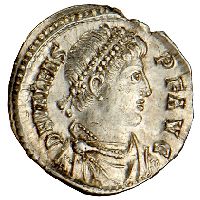
Valens r. 364 - 378 AD Eastern Roman Emperor silver siliqua (Stack's: Coin Galleries, mail bid, lot 866, July 2007) |
Siliqua are a restored Roman currency of good silver content. These were substantially
lighter than the older denarii but a paper on the XRF of apparently a small sample size
of siliquae indicate that at least up & including Theodosius II (402-450 AD), they were
~ 94% silver. |
Valens is famous as the Roman Emperor who lost the Battle of Hadrianopolis in 378 AD. A large force of Hunnic invaders were trying to settle within Roman territory. LValens Was supposed to wait for reinforcements from the Eastern Roman Emperor but for various reasons he attacked on his own. 80,000 Roman troops were estimated lost, wiping out Roman forces guarding the Empire and leaving it open for subsequent invasion. |
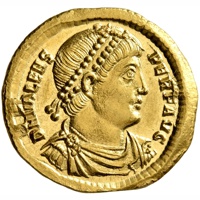
Valens r. 364 - 378 AD Eastern Roman Emperor gold solidus mint state (Leu Numismatik Auction 4, lot 757) |
dia 21 mm, wt = 4.46 g, 6h |
|
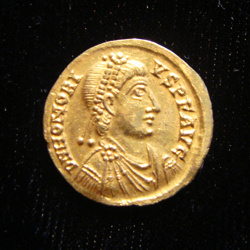
Honorius r. 395 - 423 A.D. gold solidus Gorney & Mosch, March, 2012 |
wt = 4.450 g |
----- |
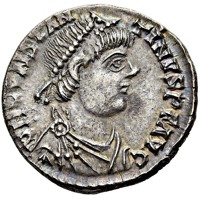
Constantine III, 407 - 411 AD co-Emperor from 409 silver siliqua (Gorny & Mosch Auction 484, lot 1117) |
diam = 16 mm, wt = 1.58 g |
|
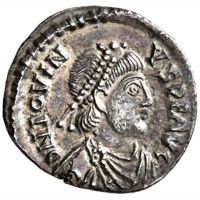
Jovinus, 411- 413 AD Usurper silver siliqua (Leu Numismatik Auction 4, lot 782) |
diam = 17 mm, wt = 1.43 g |
|
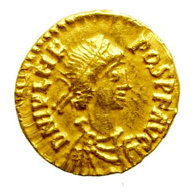
Julius Nepos 1st reign 474 - 475 A.D. gold tremissis Ed Wadell, 2014 |
wt = 2.xxx g |
Last or Next to Last Western Roman Emperor? As 480 marks the end of the juridical division of the empire into two imperial courts, some historians refer to the death of Nepos and abolition of the Western Empire by Zeno as the end of the Western Roman Empire.Wikipedia reference The traditional approach, as espoused by Gibbon in the late 1700's is the Romulus Augustus was the last Western Roman Emperor and Nepos is the penultimate one. Edwards Watts, renowned author of "Mortal Republic" published an article in Time magazine espousing the idea that "The fall of Rome in 476 is a historical turning point that was invented nearly 50 years later as a pretext for a devastating war." A link to the Times article is here: Just in case a pdf copy of the article is here (840 Kb). Rome Didn't Fall When You Thought It Did |
the value for the page url is: